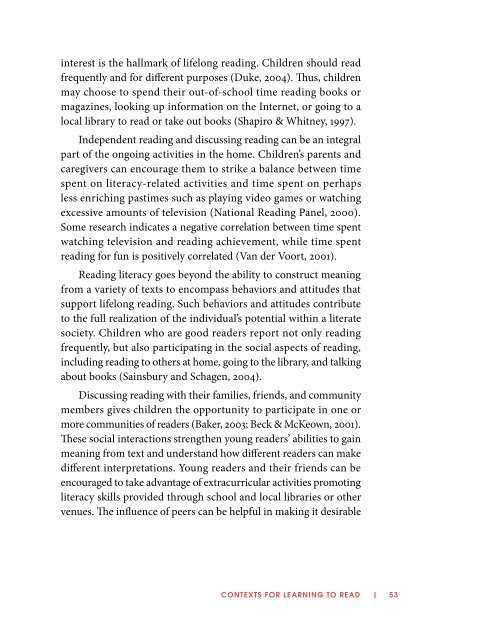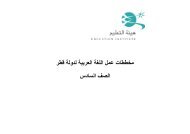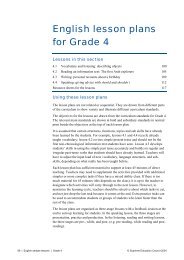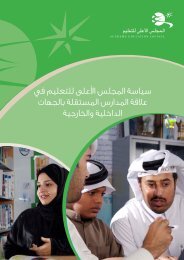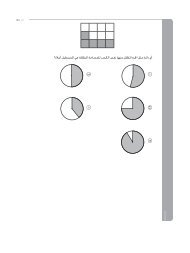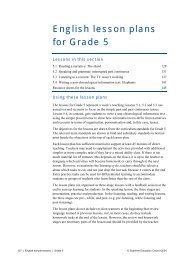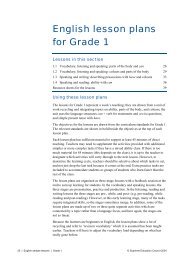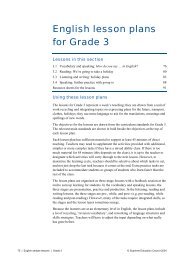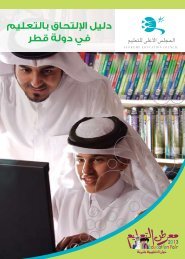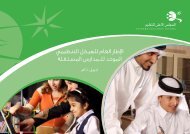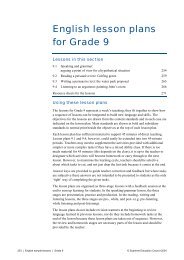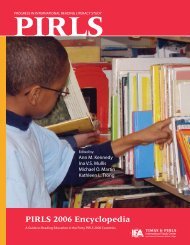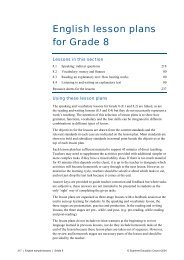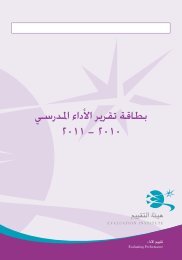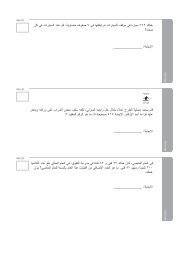of the two. The amount of homework assigned for reading variesboth within and across countries. In some countries, homework isassigned typically to students who need the most practice—thosewho tend to have the most difficulty reading or understanding whatthey have read. In other countries, students receive homework asenrichment exercises. Time spent on homework generally has aninverse relationship with achievement (Mullis, Martin, Kennedy,& Foy, 2007). Those students for whom reading is difficult requiremore time to complete the assigned homework.<strong>Assessment</strong>In addition to homework, teachers have a number of ways tomonitor student progress and achievement. Informal assessmentduring instruction helps the teacher to identify needs of particularindividuals, or to evaluate the pace of the presentation of conceptsand materials (Lipson & Wixson, 1997). Formal tests, both teachermadeand standardized assessments, typically are used to makeimportant decisions about the students, such as grades or marks,promotion, or tracking (Kennedy, Mullis, Martin, & Trong, 2007).The types of question included in tests and quizzes can send strongsignals to students about what is important. For example, teacherscan ask about a variety of textual information, such as facts, ideas,character motivations, and comparisons with other materials orpersonal experiences. Teachers also can use a variety of test formatsranging from multiple-choice questions to essays.Student Characteristics and AttitudesStudent Reading Literacy BehaviorsAs children continue to develop reading literacy, the time they devoteto reading and other recreational activities becomes significant. Thechild not only enjoys reading for recreation but also practices skillsthat are being learned. Reading for fun or to investigate topics of52 | Chapter 3
interest is the hallmark of lifelong reading. Children should readfrequently and for different purposes (Duke, 2004). Thus, childrenmay choose to spend their out-of-school time reading books ormagazines, looking up information on the Internet, or going to alocal library to read or take out books (Shapiro & Whitney, 1997).Independent reading and discussing reading can be an integralpart of the ongoing activities in the home. Children’s parents andcaregivers can encourage them to strike a balance between timespent on literacy-related activities and time spent on perhapsless enriching pastimes such as playing video games or watchingexcessive amounts of television (National Reading Panel, 2000).Some research indicates a negative correlation between time spentwatching television and reading achievement, while time spentreading for fun is positively correlated (Van der Voort, 2001).Reading literacy goes beyond the ability to construct meaningfrom a variety of texts to encompass behaviors and attitudes thatsupport lifelong reading. Such behaviors and attitudes contributeto the full realization of the individual’s potential within a literatesociety. Children who are good readers report not only readingfrequently, but also participating in the social aspects of reading,including reading to others at home, going to the library, and talkingabout books (Sainsbury and Schagen, 2004).Discussing reading with their families, friends, and communitymembers gives children the opportunity to participate in one ormore communities of readers (Baker, 2003; Beck & McKeown, 2001).These social interactions strengthen young readers’ abilities to gainmeaning from text and understand how different readers can makedifferent interpretations. Young readers and their friends can beencouraged to take advantage of extracurricular activities promotingliteracy skills provided through school and local libraries or othervenues. The influence of peers can be helpful in making it desirableContexts for Learning to Read | 53
- Page 1:
PIRLS 2011 AssessmentFrameworkIna V
- Page 4 and 5:
PIRLS 2011 Assessment Frameworkby I
- Page 7 and 8: ForewordCentral to a nation’s pur
- Page 9: number of people. I would like to e
- Page 13 and 14: Chapter 1Overview of IEA’s PIRLS
- Page 15 and 16: prePIRLSPIRLS 2011 has been extende
- Page 17 and 18: the assessment (Campbell, Kelly, Mu
- Page 19 and 20: communities outside of school as st
- Page 21 and 22: A substantial proportion of the que
- Page 23: PIRLS Reading Purposesand Processes
- Page 26 and 27: each purpose. Although the assessme
- Page 28 and 29: character, or there may be several
- Page 31 and 32: information requires that the reade
- Page 33 and 34: Interpret and Integrate Ideas and I
- Page 35: Reading tasks that may exemplify th
- Page 40 and 41: likely influence home environments
- Page 42 and 43: and the mechanisms it can establish
- Page 44 and 45: instruction in their first year, du
- Page 46 and 47: home characteristics can create a c
- Page 48 and 49: need to reach out to inform, encour
- Page 50 and 51: As an instructional leader, the sch
- Page 52 and 53: Parental InvolvementThe success of
- Page 54 and 55: effective teachers continue to acqu
- Page 56 and 57: Instructional Materials and Technol
- Page 60: to participate in such activities.
- Page 65 and 66: Chapter 4Assessment Design and Spec
- Page 67 and 68: prePIRLS assessment consists of six
- Page 69 and 70: In PIRLS 2011, similar to PIRLS 200
- Page 71 and 72: Figure 4PIRLS 2011 Student Booklet
- Page 73 and 74: Each multiple‐choice question is
- Page 75 and 76: approximately seven multiple-choice
- Page 77 and 78: Figure 6prePIRLS 2011 Student Bookl
- Page 79 and 80: Learning to Read Survey (Home Quest
- Page 81: References
- Page 84 and 85: Baker, L., Dreher, J.J., & Guthrie,
- Page 86 and 87: Ehri, L. (1995). The emergence of w
- Page 88 and 89: Kamil, M.L., Intrator, S.M., & Kim,
- Page 90 and 91: Miller, S. D., & Faircloth, B. S. (
- Page 92 and 93: Scarborough, H.S. (2001). Connectin
- Page 94 and 95: Weaver, C.A., & Kintsch, W. (1996).
- Page 96 and 97: Hameedy, M.A. (2004, May). Bilingua
- Page 98 and 99: Netten, A., Verhoeven, L., & Droop,
- Page 101: Appendix AAcknowledgements
- Page 104 and 105: specifically acknowledge some of th
- Page 106 and 107: PIRLS 2011 Questionnaire Developmen
- Page 108 and 109:
CanadaPierre BrochuCouncil of Minis
- Page 110 and 111:
LuxembourgPierre RedingMinistère d
- Page 113 and 114:
Appendix BSample PIRLS Passages,Que
- Page 115 and 116:
Anina could not believe her eyes as
- Page 117 and 118:
She could hardly believe what happe
- Page 119 and 120:
QuestionsAn Unbelievable Night****C
- Page 121:
***Correct answersAmple PIRLS Passa
- Page 124 and 125:
Scoring Guides for Constructed-resp
- Page 126 and 127:
Unbelievable Night, Item 11You lear
- Page 128 and 129:
122 | Appendix B
- Page 130 and 131:
Follow an Ant TrailAnts live togeth
- Page 132 and 133:
Make a WormeryWorms are hard to stu
- Page 134 and 135:
QuestionsSearching For Food***Corre
- Page 136 and 137:
**Correct answer130 | Appendix B
- Page 138 and 139:
132 | Appendix B
- Page 140 and 141:
Scoring Guides for Constructed-resp
- Page 142 and 143:
Searching for Food, Item 11Number t
- Page 145 and 146:
Appendix CSample prePIRLS Passage,Q
- Page 147 and 148:
1. Where was Charlie at the beginni
- Page 149 and 150:
3. Write two things that Charlie di
- Page 151 and 152:
7. What did Charlie see a flyer for
- Page 153 and 154:
10. How can you tell that Dave’s
- Page 155 and 156:
15. What did Charlie keep looking f
- Page 157 and 158:
Charlie’s Talent, Item 5What were
- Page 159:
Charlie’s Talent, Item 10How can


